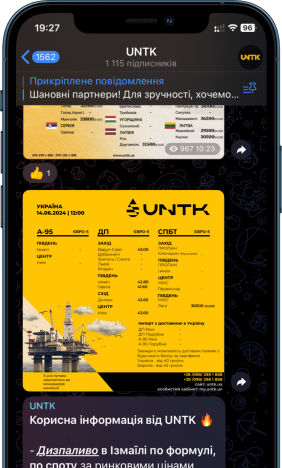

Modern Fuel Consumption Control Systems: How Digital Technologies Help Businesses
In today's business environment, managing fuel expenses is one of the key components of operational efficiency, especially for companies that heavily rely on vehicles or large-scale production facilities. Fuel expenses can significantly affect a company's financial results, which is why businesses are increasingly adopting digital technologies to monitor and control fuel consumption. Digitizing this process not only helps reduce costs but also boosts overall business efficiency.
1. GPS Monitoring and Telemetry: The Foundation for Optimizing Routes and Fuel Consumption
One of the main tools that enables businesses to accurately track fuel consumption is GPS monitoring. Using GPS systems allows real-time tracking of vehicle locations, which helps optimize routes and reduce fuel consumption. Moreover, telemetry systems gather information about the technical condition of vehicles, their speed, and other parameters that influence fuel usage. This data allows companies to identify and address technical issues that could lead to excessive fuel consumption.
2. Automated Fuel Accounting Systems: Accuracy and Transparency in Expenses
Automated fuel accounting systems allow businesses to monitor fuel consumption in detail at every stage, from fueling to usage. All transactions are recorded in the system, providing an accurate view of when and how much fuel was used. This enables businesses to eliminate inefficiencies, improve financial transparency, and prevent misuse.
3. Analytics and Forecasting: How to Prevent Unexpected Expenses
Digital technologies not only track current expenses but also provide detailed data analysis for forecasting future fuel needs. Analytical tools allow companies to spot trends in fuel consumption, identify areas where savings can be made, and forecast fuel costs based on historical data. This helps more accurately plan fuel purchases and optimize budget expenditures.
4. Technologies for Monitoring and Managing Fuel Consumption
Innovations in resource management, particularly fuel consumption monitoring systems, are becoming essential tools for businesses. With modern technologies, companies can automatically track fuel consumption, identify inefficient processes, and make adjustments. This allows businesses to significantly reduce fuel costs and improve operational efficiency.
5. Reliability and Transparency of Fuel Suppliers
The instability of the fuel market forces businesses to pay special attention to selecting reliable suppliers. Key factors now include not only the price and quality of the fuel but also the stability of supply, delivery flexibility, and availability of backup options in case of unforeseen circumstances. Businesses are seeking suppliers who can ensure uninterrupted fuel delivery over the long term.
6. Environmental and Economic Benefits of Digital Technologies
Implementing digital fuel consumption control systems not only reduces fuel costs but also has a positive impact on the environment. Optimizing routes, reducing fuel waste, and lowering emissions contribute to a more efficient and environmentally friendly business. For companies committed to environmental standards, this is an important step towards sustainability.
7. Data Security and Reliability
Modern digital solutions for fuel consumption monitoring guarantee high data security levels. Systems use secure communication channels for data transmission and ensure the integrity of transaction records, preventing tampering or manipulation. Additionally, automation reduces the risks of human error and improves overall control over fuel consumption.
Digital technologies used for fuel consumption control allow businesses to significantly improve operational efficiency, reduce costs, and ensure financial transparency. From GPS monitoring to automated accounting systems and analytics, these technologies open new possibilities for optimizing fuel consumption and resource management. “UNTC” offers its partners not only high-quality fuel but also comprehensive solutions for effective fuel management. Investing in innovative digital technologies will help mitigate risks and improve your business's profitability.
